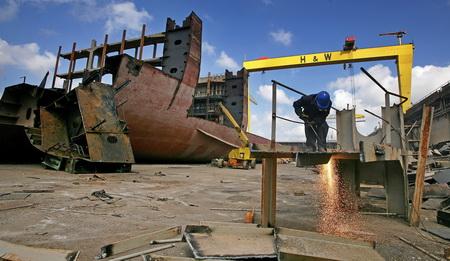BEIJING: As the shipbuilding industry struggles to recover from the global recession, China's ship scrapping business has become a smorgasbord for both factories and investors.

A worker cuts up pieces of the MSC Napoli cargo ship in a dry dock in Belfast, Northern Ireland. Global shipyard capacity is set to increase by 161 percent from 26 million tons in 2005 to 68 million tons in 2011. [Agencies]
"This is really unparalleled, definitely (like striking gold)" said Hao Liang, office director of Changjiang Ship-Recycling Yard, one of China's largest scrapping bases located in Jiangyin city, Jiangsu province.
He said the scrapping business might show a mild declining trend this year from the blowout in 2009 buoyed by gloomy world trade and weak freight rates, but the situation may improve if the price of scrap iron and steel continues to soar skyward.
Ship breaking or ship demolition companies usually buy in vessels and sell the scrap to iron and steel companies nearby to book a profit. The price of iron and steel scrap has risen to more than $400 per ton from $150 per ton last year.
From January through April 6, the Changjiang Ship-Recycling Yard has scrapped 18 vessels. Last year it scrapped around 90 vessels in total, after a five-year lull with no orders at all.
Analysts said the phasing out of single-hull oil tankers, low bulk freight rates and an over supply of container vessels are the main factors contributing to the positive outlook for the scrapping market over the next few years.
Global capacity is set to increase by 161 percent from 26 million tons in 2005 to 68 million tons in 2011. While in China, capacity is set to increase by 525 percent over the same period from 4 million to 25 million tons.
"The more we scrap, the better the market will be," said Gao Yanming, chairman of Hebei Ocean Shipping Co based in Hebei province, calling for all ships more than 23 years old to be scrapped in order to reduce capacity.
Spurred by unprecedented demand, the country last year scrapped 442 ships, a 440 percent increase year-on-year, according to the China National Shiprecycling Association.
Meanwhile, the number of scrap factory workers rose by more than 30 percent compared with the period before Lehman Brothers went bankrupt, Maritime China magazine reported.
The average profit ratio of the industry has increased to more than 30 percent since last year from the previous 8 percent, which is close to the current profit ratio of the shipbuilding industry, said Xu Hui, executive manager of the China Ship Fund.
"That means scrapping a vessel is much more profitable than building one," he said.
The outperforming sector has attracted huge amounts of international capital flowing into China's coastal areas, a source familiar with the matter said, without elaborating.
"Now Chinese own 50 percent of scrapping capacity, with international capital taking up the other half," said the source, adding overseas investors are taking advantage of shipbuilders' surplus capacity to scrap vessels along the coast, which has created a booming "tax-free" spot market for iron and steel scrap.
Xu predicted the ship scrapping market will swell by 30 percent in 2010, but might not be a good time to invest.
"The best time to invest has gone. When everyone is optimistic, the profit ratio will go lower and lower. Overall the price of the iron and steel scrap has already increased to a high that is risky to gamble on," he said, estimating it may surge to $800 per ton this year.
Ship breaking or ship demolition is a type of ship disposal involving the breaking up of ships for scrap recycling, with the hulls being discarded in ship graveyards.
Most ships have a lifespan of a few decades before the wear is so great that refitting and repair becomes uneconomical.





